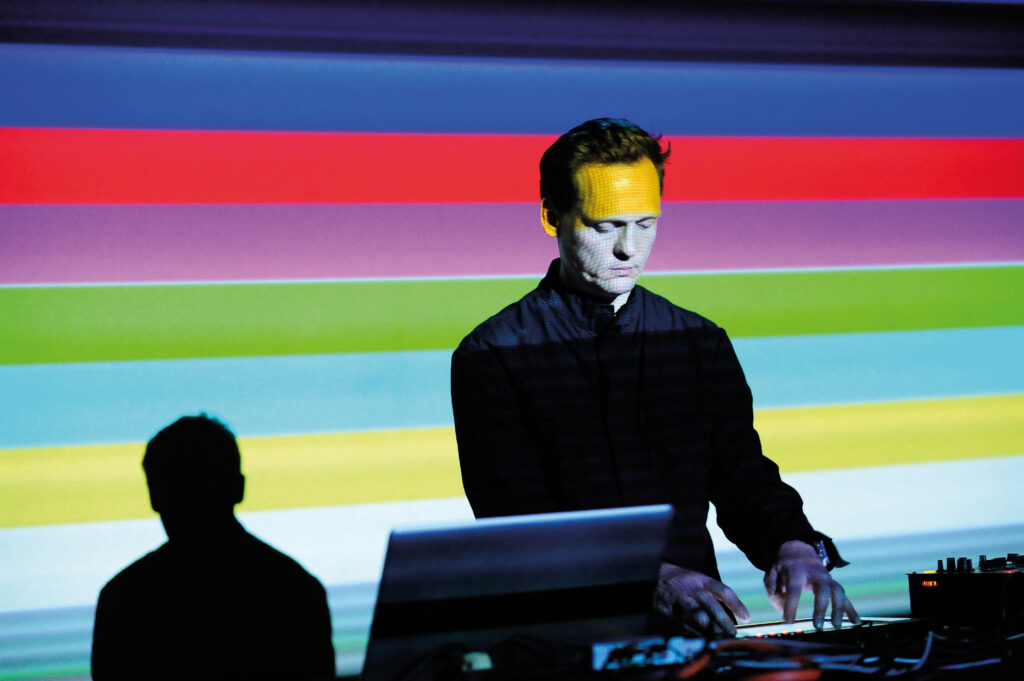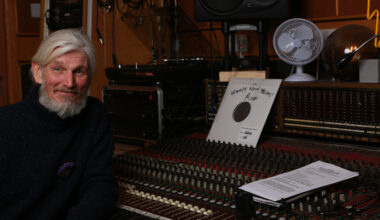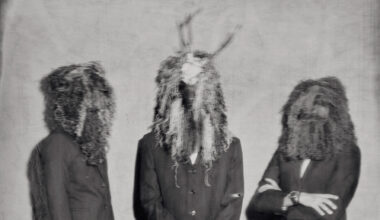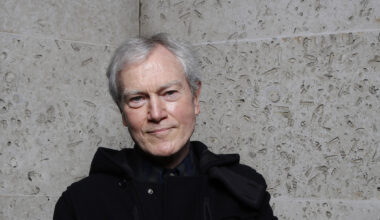You may know Carsten Nicolai, AKA Alva Noto, from his pioneering work as co-founder of glitch techno label Raster-Noton, or maybe from his collaborations with Ryuichi Sakamoto. Or there’s his work with Michael Nyman and a talking budgie…

Carsten Nicolai has an instinct for building things. At school in East Germany, surrounded by gothic grandeur, he fell in love with building design – little knowing he would later construct some of the most cutting-edge music of recent times.
If you saw Leonardo DiCaprio get battered by a bear in ‘The Revenant’, you know Carsten’s music. If you’ve seen eye-popping installations in the Guggenheim or Tate Modern, perhaps you’ve heard Carsten’s music. If you once attended an opera about a talking budgerigar called Sparkie, you most definitely have experienced Carsten’s music.
“Ah! Michael Nyman and the budgie bird!” recalls Carsten. “That project was really funny, and if you know Michael Nyman, he’s got this very British humour. We never did finish that album…”
More of which shortly. We start this story with Carsten the architect. Blueprints, pencil sketches, pages full of scribbled cubes. He’d been teaching people to tend gardens and, after dropping out of GDR military service, he studied architecture and landscape design. But his career in making buildings took a surprising detour when, one day, he had an artistic crisis.
“I was bored!” he says. “My architectural drawings were too static. I felt depressed, so I started experimenting with sound and oscillators.”
By the turn of the millennium, Carsten was running the ice-cool Chemnitz-based minimal label Raster-Noton which pionnered glitch techno, a form of electronic music that lives between the cracks. The imprint also lay the foundation for Carsten’s own compositions under the name Alva Noto. On his debut ‘Prototypes’ in 2000, he pushed the minimalism to the absolute floor: rhythmic hums, looping static, an uncompromising musical vision entirely informed by his architectural roots.
“I have many invisible blueprints in front of me,” he says. “You might see a house that isn’t finished yet, no doors or windows, like a skeleton. They might add the fancy stone cladding later, but the most beautiful part of the building is that simple structure. That’s how I think of my music.”
His discography is less minimal, with collaborators including Ryoji Ikeda, Olaf Bender and, in full poetic voice, Iggy Pop reading Walt Whitman. But it’s his work with legendary Japanese composer Ryuichi Sakamoto that really grabs the attention. Their first joint venture, ‘Vrioon’ in 2002, was declared album of the year by The Wire magazine in 2004, but the apparent simplicity of Alva Noto prodding Ryuichi’s piano with pinpoint electronics was hard to come by.
“There were only two or three piano notes I wanted to keep from our early sessions. Ryuichi is a very open-minded and curious person. He said maybe we should simplify things – he does the piano and I do the sounds. Limitation can create a little universe of options, so we kept to that style for the next four albums.”
Their latest long-player ‘Glass’ is the ultimate designer’s dream. They took architect Philip Johnson’s Connecticut home Glass House, which is, er, a house made of glass, and made its transparent walls sing with a gong mallet.
“The view was fantastic,” remembers Carsten, “but I wouldn’t want to live there.”
Another career marker was their phenomenal soundtrack for ‘The Revenant’. The movie saw Leonardo DiCaprio playing frontiersman Hugh Glass as he tried to survive wild 1800s America. Ryuichi was recovering from throat cancer and so partnered up with Carsten to work on the soundtrack. However, the partnership broke Academy rules and they were controversially denied an Oscar nomination. Director Alejandro González Iñárritu called the decision “scandalous”. But Carsten was just helping out a friend.
“Ryuichi was really struggling,” he says, “it’s not easy after a long break. I’d been doing a series called ‘Xerrox’ in which I would take a melody and degrade it with a copying process. By chance, a file I had on a field recorder was destroyed, but in a beautiful way. When I was invited to work on ‘The Revenant’, these degraded recordings fitted well – you can hear them in the movie.”
Amid all this music as Alva Noto, Carsten was using his real name to assemble an enviable career as an installation artist. His repertoire is staggering. A tennis ball gun triggering tunes from suspended shields; an illuminated punch-card playing notes as far as the eye can see; a Hong Kong building a third of a mile high pulsing light across the city (there’s the architecture again). He often generates visuals automatically from audio sources, like Windows Media Player, but in a billion dimensions.
“Making visuals is a serious amount of work, so maybe this is because I’m lazy, but I made a lot of graphic analysers. It’s really important that the visuals feel connected to the music.”
Carsten, it seems, has an instinct for building things. His career is a multi-cladded complex of endless creative corridors. His latest solo Alva Noto album takes yet another new turn. ‘UNIEQAV’ is a determined digital assault inspired by Tokyo club culture. Yet there is an unfinished room in the house of Nicolai: something that could be argued as his only career failure to date. That blasted budgerigar.
In the mid-20th century, Sparkie the budgie had appeared on television advertising bird seed in a Geordie accent. This was way before John Lewis’s insufferable seasonal schmaltz.
Sparkie Williams – for that was his full name – was quite a star in those pre-Beatles days, and could recite eight nursery rhymes in his Brown Ale twang. The poor bird has long since been stuffed and stuck on display in Newcastle’s Hancock Museum, but in 2009 he was jetted to Berlin for a performance of ‘Sparkie: Cage And Beyond’, an opera written by Carsten and multi-platinum musicologist Michael Nyman. They even used audio from the original advert.
Carsten seems delighted that I’ve mentioned Sparkie’s opera, but it was a project that never truly got off the ground.
“That’s one of the few things I regret not finishing,” he says, “We wanted to do an album and a book. People always ask me about it but it’s just sitting in an archive. Maybe one day we’ll put out all the budgie bird material.”
‘UNIEQAV’ is out on NOTON





